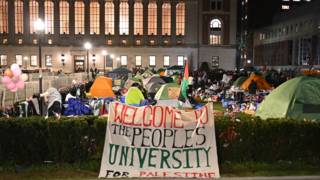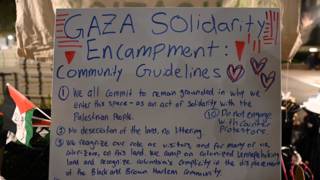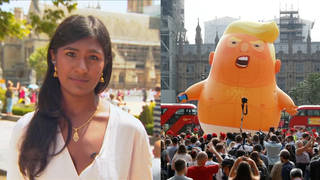
Related
President Trump is meeting with Prime Minister Theresa May today, just hours after warning that a “soft Brexit” will kill Britain’s chances of a future trade deal with the United States. In an explosive interview with the Rupert Murdoch-owned British tabloid The Sun in which Trump claimed that Britain is losing its culture due to immigration, Trump said Theresa May had ignored his advice on Brexit negotiations. We speak with Gary Younge, editor-at-large for The Guardian and a columnist at The Nation.
Transcript
AMY GOODMAN: I want to now go to Gary Younge, in studio in London, editor-at-large for The Guardian and columnist at The Nation magazine. Gary, if you can respond to the visit of President Trump and the protests forcing him to change his itinerary? He is afraid to be in London right now, or just is refusing to be here, visited Sandhurst in the morning and is now with Prime Minister Theresa May.
GARY YOUNGE: Well, yeah, I think there are two things that really explain these protests. And the first is domestic, really, which is our utter embarrassment and horror that our government and our prime minister would be the first out of the blocks to run and have invited Trump. She rushed to be the first prime minister, first world leader, to have met him. And his visit is an insult to every right-minded, right-thinking person, but then, particularly, given his Islamophobic comments, his misogynist comments, his racism and so on, to the kind of—the kind of Britain that many of us are engaged in building, to every migrant, to every black person, to every Muslim and so on. And so, domestically, for our own sake, we have to say that this man is not welcome.
You know, Britain has a law that people—for example, Louis Farrakhan, Minister Farrakhan, is not allowed to come to Britain, because it has decided that his presence would not be conducive to the public good. Now, I’m not making a comment on that necessarily, but if you can ban Farrakhan, you can ban Trump. His presence is not conducive to the public good.
But then, secondly, to give our solidarity to the resistance in America, that—I was The Guardian correspondent in America for 12 years. We know that while Trump did win the election, he doesn’t represent a vast number of Americans—actually, most Americans, even if you just take the numbers who voted for him and Clinton—and that it’s important that the world understands that he’s not welcome here and that, actually, all of those people who have been out demonstrating—the women’s marches, the marches against the border protests, the marches against his racism and Islamophobia and so on—that we are with you, that we are with you, and that most countries—in Europe particularly, but beyond—have their own version of a Trump, and so we are all in this together.
AMY GOODMAN: So, this interview that Trump did with The Sun—and for people in the United States to understand, this tabloid, owned by Rupert Murdoch—in which he praised Foreign Secretary Boris Johnson, who resigned earlier this week. This is what he said.
PRESIDENT DONALD TRUMP: I was very saddened to see that he was leaving government. And I hope he goes back in at some point, because I think he’s a very—I think he’s a great representative for—for your country. I was very surprised and saddened that he was getting out of government. And you lost some other very good people. Well, I’m not pitting one against the other. I’m just saying I think he’d be a great prime minister.
AMY GOODMAN: Now, I don’t know if Donald Trump’s presence and his words make you feel any sympathy for the prime minister, Theresa May, Gary, but this explosive interview where he’s basically endorsing the person who will be her competitor, right, Boris Johnson?
GARY YOUNGE: Yeah, I mean, there is a touch here of the chickens coming home to roost, right? I mean, not only is he insulting immigrants and Muslims and the London mayor and so on, but he’s actually insulting his hostess, the very person who invited him. And it’s as though, you know, the term “diplomacy” never happened. He comes out of Europe, out of the NATO summit, having pretty much insulted everybody, and then said, “Well, I think that went quite well.” And now here he is.
Boris Johnson is a buffoon. He is an incredibly—he’s from a, you know, very upper-class background. He went to Eton, which is the same school that the queen’s kids go to and, actually, David Cameron, the previous Tory prime minister, went to. You don’t get much more elite than that. He has gone in print talking about smiling “piccaninnies” with their “watermelon smiles.” I mean, he’s—and he was a terrible foreign secretary. And the reason he resigned, having been a significant part of the Brexit campaign, is really not as a point of principle—I’m not sure that he has many of those—but as a point of ambition, that they went to Checkers, which is the prime minister’s residence, and she laid out her Brexit policy, which, you know, is not a great policy because Brexit is not a great idea. And Johnson said it was like “polishing a turd.” Then he said he’d support it anyway. Then, within about 48 hours, someone else had resigned, and he thought, “Oh, here’s my chance maybe. Here’s my chance, so I should resign, too.” This is not a man of principle. He’s not our future prime minister. He’s a very, very bad joke that’s been played on both this country and the rest of the world.
AMY GOODMAN: I wanted to ask you about Sadiq Khan, the mayor of London. It’s not only the mayor of London. The home secretary, who came into office in just the last few months, also his heritage is from Pakistan.
GARY YOUNGE: Yeah.
AMY GOODMAN: Do you think these were direct hits on the changing complexion of British politics?
GARY YOUNGE: Well, yeah. I mean, he’s—Trump is a racist. And so, first of all, his comments are ahistorical, I mean, in the words of Sivanandan. My parents are from Barbados. Well, we are here in Britain because you were there, Britain, you know, that my mother came to this country as a British citizen, that most of these places that he’s talking about, like Pakistan, were under British rule. And so, you know, if you’re wondering where this migration comes from, well, then, it’s right there in your history.
But a fundamental misunderstanding about what modern life in most of Europe is like—because he’s right: We have changed the fabric. Look at most of the football teams. Look at the French football team, that got to the final, or the British football team, that just got knocked out, or the Belgian football team. Yes, look at our Parliament. Now, you know, a long way, a long, long way, from saying that we’ve achieved anything in the realm of equality, but the fact of our presence is not contested, until you start talking to someone like Trump, who’s like, “Well, what are all these people doing here?”
So, yes, Sajid Javid, who is of Pakistani origin, is the new home secretary. Sadiq Khan, of Pakistani heritage, is the London mayor. And frankly, for us in London, for most of us in London, that’s a banal fact of life. They tried to smear Sadiq Khan with accusations that he was kind of, in some way, connected to jihadi gang—it didn’t work. It didn’t work because, for the most part, Londoners are over that. They can see past that. And we understand—
AMY GOODMAN: Gary, this is—
GARY YOUNGE: —both our present and our future as being both British and multiracial and multicultural—
AMY GOODMAN: Gary, this is your mayor—
GARY YOUNGE: —and that those things aren’t complicated, apart from a guy like Trump.
AMY GOODMAN: This is your mayor, London Mayor Sadiq Khan, responding to Trump’s racist rant on Good Morning Britain.
MAYOR SADIQ KHAN: Well, my message to President Trump is: We Londoners love your country. We love Americans. There are Americans here who contribute to our city economically, socially and culturally, and we thank them for what they do. But I hope you realize we, as a city, are really diverse. We have a variety of views that are held by many people. Piers, you’re a Londoner. I’m a Londoner. We’re both Londoners. We have different views, but we respect each other. And the wonderful thing about our city is our diversity. It’s a strength, not a weakness. And I hope, during the course of the next two days in our city and our country, you’ll experience some of that diversity, and you’ll realize it’s a strength, not to be afraid of, but to be cherished.
AMY GOODMAN: That’s the mayor. I wanted to ask you to respond to what he’s saying and also the effects of Britain—of Brexit on communities of color, on poorer communities. What is—is there a disparate effect? And what is the Brexit that President Trump has so attacked, that Theresa May is putting forward, that Boris Johnson has quit over?
GARY YOUNGE: Well, there were—first of all, I should say I voted to remain. I voted against Brexit. But there were reasonable arguments about why we should leave the European Union. It wasn’t all one way. But sadly, most of those arguments weren’t made and certainly didn’t come to the fore. So, it primarily became a vote about immigration, sovereignty, in a warped way, in a kind of very little England mentality. And so, then we leave the European Union, and Britain starts to find out how small it is, that, yes, at one stage, “The sun never set on the British Empire” was a phrase, and that was true, but the empire is gone, and we are a small country. And we worked better in—when we were part of a large unit. And we no longer are.
So, then, having—and Theresa May didn’t support Brexit. Johnson did. Theresa May didn’t. But then, once the vote had been taken, then the question is how you leave. And it’s taken a year and a half of the government negotiating with itself before it could come up with a plan. And the plan is not very good. The plan is not very good, because what the plan says is we will take most of the—we will accept most of the rules of the European Union, but we’ll be outside of it, and so we won’t have much of a say—or any say, actually.
Now, the trouble is, there isn’t really a good way for Britain to leave the European Union and for that to work out well. And so, when Trump says, “Well, if I was doing it, it would have been different,” well, it would have been worse, almost certainly worse. And so, there is a—the problem in terms of the Brexit that’s been negotiated is that they are trying to make the best out of a very bad job, and they are making—and they’re also making a hash of it.
When it comes to the spinoff from Brexit, there is this thing that is now called—the people are calling “xeno-racism,” which is the racism that is tied with xenophobia. So, much of the Brexit—anti-immigration Brexit conversation was about the number of Polish people, Romanians, Eastern Europeans who have come in with open EU borders and who, some people argue—wrongly, I think—are pushing wages down. Now, that xenophobia has bled, quite easily, quite effortlessly, into attacks on black and brown people, who nobody assumes are coming from Romania or Poland. So, the number of attacks on women wearing hijabs, on black people, spiked and has continued to be high after Brexit.
Now, in terms of who is going to be worst affected, honestly, I think the people who are going to be worst affected are many of the people who actually voted for Brexit—many white people in rundown, working-class northern towns. Most black people voted to remain in the European Union. Most Muslims voted to remain. But many white working-class people, particularly in northern post-industrial towns, that, in many ways, were supported by European Union funds, but who felt that this was a chance to give the establishment a kick in the teeth, they are probably the people who will be worst affected. And that’s a shame.
AMY GOODMAN: Gary Younge, we want to thank you so much for being with us, editor-at-large for The Guardian, columnist at The Nation. His latest piece is “For May, the 'special relationship' means craven compliance.”
This is Democracy Now! When we come back, a Mexican journalist who’s seeking asylum in the United States, who has lived here for 10 years, was detained. A judge says his free speech rights may have been violated, because he was detained after criticizing the U.S. government. Stay with us.












Media Options